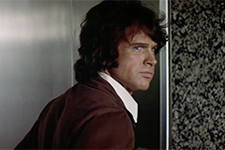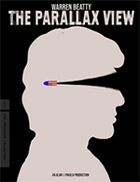The Parallax View
|  Arguably the quintessential paranoid conspiracy thriller of the Watergate era, Alan J. Pakula’s The Parallax View imagines a world in the which American democracy is little more than a front for a behind-the-scenes power scheme that uses political assassination as its primary vehicle for enforcement. This idea never seemed so plausible as it did in the early 1970s when the country was reeling from more than a decade of such killings, starting with John F. Kennedy’s very public assassination in 1963, followed days later by the very public assassination of his supposed killer, Lee Harvey Oswald. The 1960s ended with the public assassinations of civil rights leaders Malcolm X in 1965 and Martin Luther King Jr. in 1968 and then JFK’s brother Robert Kennedy that same year. The fact that there was then, and continues to be, credible evidence that these killings were the work of various factions of the United States government and military makes them all the more sinister. Twelve years earlier John Frankenheimer had given us The Manchurian Candidate (1962), a political thriller about a plot by the North Koreans to brainwash captured U.S. soldiers and turn them into clockwork assassins that was immediately suppressed in the aftermath of Kennedy’s assassination. That film was just absurd enough to potentially play as satire, an edge that Pakula’s film purposefully lacks. The Parallax View is deadly serious in its vision of how the surface of American exceptionalism is just a ruse and that underneath is a shady netherworld of political machinations backed by violence, the depths of which we cannot even begin to fathom—which is, of course, precisely the point and the jumping-off place for the narrative, which centers on Joseph Frady (Warren Beatty at the height of his stardom), a scruffy investigative journalist who is drawn into investigating the mysterious deaths of witnesses to the assassination of a political candidate at the top of Seattle’s Space Needle. Bodies keep turning up, including Lee Carter (Paula Prentiss), a television journalist and ex-girlfriend who, the day before dies, shows up at his apartment in a frazzled state, telling him that witnesses are being killed and she fears that she is next. Frady’s editor, Bill Rintels (Hume Cronyn), is naturally skeptical, but he allows Frady to pursue the story and even protects him when it becomes clear that he is onto something. The deeper Frady probes, the darker the revelations, as he discovers the extent of the plot reaches virtually all sectors and all levels of American society, placing him in the terrifying position of not being able to trust anyone. The screenplay, which was penned by David Giler (Myra Breckinridge) and Lorenzo Semple Jr. (Papillion, Three Days of the Condor) from the 1970 novel by Loren Singer, has Frady going undercover to root out what is happening in the titular Parallax Corporation (which is housed in a glass office building, the entrance to which appears to be sitting among concrete sand dunes), which results in one of the film’s signature sequences in which he is placed in a room to watch a video montage that, as it unspools, becomes more and more visually aggressive in challenging all the sacrosanct institutions of American identity—love, mother, father, home, country, God, happiness, etc. It is a test designed for sociopaths, and it is brilliantly sociopathic in and of itself. The plot eventually winds its way to a major political candidate named Charles Carroll (William Joyce), who Frady is convinced is the next target and whom he endeavors to save. If you have seen any of the other paranoid conspiracy films of this same era, notably Francis Ford Coppola’s The Conversation (1974) and Roman Polanski’s Chinatown (1974), you will not be surprised to discover that things do not end well for Frady. Like The Conversation’s professional tapper Harry Caul and Chinatown’s private detective Jake Gittes, Joseph Frady is in way over his head in a dark world that he literally cannot fathom until it is too late (although the fact that he is played by a mega-watt, handsome marquee movie star of Beatty’s caliber, even in unwashed scruffy mode, makes his failure all the more shocking and unnerving). Pakula had made an instant name for himself with Klute (1971), another dark thriller that won Jane Fonda an Oscar for playing a paranoid call girl, and The Parallax View made for an intriguing follow-up—essentially a darker dive down the same hole. Working again with cinematographer Gordon Willis, who had recently shot Coppola’s The Godfather (1972) and its sequel, Pakula gives The Parallax View an encroaching sense of visual claustrophobia. Even though the film opens with the attention-grabbing Space Needle scene, which climaxes with the assassin being chased across its perilously sloped roof, it moves into increasingly dark and confined spaces, so that when we reach the climax, which takes place within a large convention center space being readied for a speech, the wide open expanse takes on the aura of confinement because the assassin or assassins could be anywhere. The very breadth of the space suggests the sheer enormity and concomitant uncontainability of the plot Frady confronts. Moreso than just about any film of its era, The Parallax View confronts us with the true horror of the old conundrum, “Is it still paranoia if they’re really after you?”
Copyright © 2021 James Kendrick Thoughts? E-mail James Kendrick All images copyright © The Criterion Collection | |||||||||||||||||||||||||||||
Overall Rating: 


 (3.5)
(3.5)


